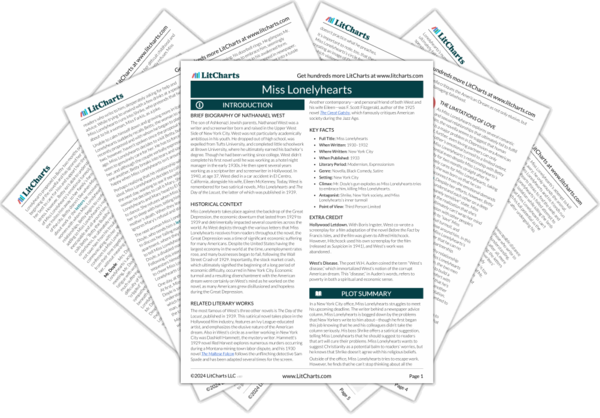Although Miss Lonelyhearts is, in some ways, motivated to write his advice column by his Christian beliefs and “love of humanity,” his progressively disingenuous relationship to his Christianity portrays religion as a coping mechanism that no longer has a place in a largely immoral, modernizing world. Surrounded by nonreligious individuals like Shrike, who makes fun of Miss Lonelyhearts for admiring Jesus Christ, and Betty, who changes the subject when Miss Lonelyhearts brings up God, Miss Lonelyhearts is alone in his religious values. His friends also view him as a ridiculous religious fanatic and an “escapist,” joking that even if he were to have a religious experience, only a psychologist would be able to find meaning in it. Importantly, however, Miss Lonelyhearts is morally enigmatic at best. Although he has a self-proclaimed “Christ complex” and empathizes with the readers who write to his advice column asking for help, he’s also deeply abusive to those around him: he neglects and lies to Betty after proposing to her, covets Shrike’s wife Mary and tries to coerce her into sleeping with him, and brutally assaults Mrs. Doyle. Through these numerous acts of abuse and violence, Miss Lonelyhearts demonstrates that he isn’t genuinely religious: he may want to share his supposedly Christian beliefs with others, but his actions convey that he doesn’t practice what he preaches.
It’s important to note, too, that the nonreligious characters in Miss Lonelyhearts’s circle frequently act in malicious ways, creating an image of Depression-era New York City as a place in which violence and immorality run rampant. Miss Lonelyhearts, with his already shaky religious foundation, acts progressively crueler to those around him as the novella progresses. For example, he joins his friend Ned Gates in tormenting a random old man named George for potentially being homosexual. Additionally, following Miss Lonelyhearts’s “religious awakening” in which he believes that he has become God, he doesn’t seem to regret his needless violence against women such as Mrs. Doyle, and his attempt at extending kindness to Mr. Doyle culminates in Miss Lonelyhearts’s death. In this way, the novella not only suggests that religion is an ineffective, superficial way of coping with the modernizing world, but that even morality and kindness occupy a forgotten place in Depression-era American society.
Religion and Morality in Modern Society ThemeTracker

Religion and Morality in Modern Society Quotes in Miss Lonelyhearts
Shrike again began to shout and this time Miss Lonelyhearts understood that he was making a seduction speech.
“I am a great saint,” Shrike cried, “I can walk on my own water. Haven’t you ever heard of Shrike’s Passion in the Luncheonette, or the Agony in the Soda Fountain?”
He got undressed immediately and took a cigarette and a copy of The Brothers Karamazov to bed.
“Love a man even in his sin, for that is the semblance of Divine Love and is the highest love on earth. […] And you will come at last to love the whole world with an all-embracing love.”
They paraded the lamb through the market. Miss Lonelyhearts went first, carrying the knife, and others followed, Steve with the jug and Jud with the animal. As they marched, they sang an obscene version of “Mary Had a Little Lamb.”
“Betty the Buddha,” he said. “Betty the Buddha. You have the smug smile; all you need is the pot belly.”
His voice was so full of hatred that he himself was surprised. He fidgeted for a while in silence. […] More than two months had passed since he had sat with her on this same couch and had asked her to marry him.
Miss Lonelyhearts tried to get Gates to leave, but he refused to go without the old man. They both grabbed him and pulled him out of the stall and through the door of the comfort station. He went soft in their arms and started to giggle. Miss Lonelyhearts fought off a desire to hit him.
When the old man still remained silent, he took his arm and twisted it. Gates tried to tear him away, but he refused to let go. He was twisting the arm of all the sick and miserable, broken and betrayed, inarticulate and impotent. He was twisting the arm of Desperate, Broken-hearted, Sick-of-it-all, Disillusioned-with-tubercular-husband.
He tried again by becoming hysterical. “Christ is love,” he screamed at them. It was a stage scream, but he kept on. “Christ is the black fruit that hangs on the crosstree. Man was lost by eating of the forbidden fruit. He shall be saved by eating of the bidden fruit. The black Christ-fruit, the love fruit…”
Miss Lonelyhearts stood it with the utmost serenity; he was not even interested. What goes on in the sea is of no interest to the rock.
He begged the party dress to marry him, saying all the things it expected to hear, all the things that went with strawberry sodas and farms in Connecticut. He was just what the party dress wanted him to be: simple and sweet, whimsical and poetic, a trifle collegiate yet very masculine.
He did not understand the cripple’s shout and heard it as a cry for help from Desperate, Harold S. Catholic-mother, Broken-hearted, Broad-shoulders, Sick-of-it-all, Disillusioned-with-tubercular-husband. He was running to succor them with love.











